24 may 2015

By Khalid Amayreh
I feel I must salute the German Bundestag President Norbert Lammert for refusing to meet with Abdul Fattah al Sissi, the head of the bloody ruling junta in Egypt.
El-Sissi is planning to visit Germany in early June, probably to seek further legitimacy for his authoritarian regime.
On Wednesday, Lammert told the broadcaster Deutsche Welle that he didn't know what the head of an elected parliament would talk about with the 'undemocratic' Sisi
In his Wednesday interview with Deutsche Welle, Lammert was quoted as saying that "in light of these circumstances, I don't know what the president of an elected parliament and the president of a country that is regrettably not led democratically have to talk about."
Lammert's remarks came following a letter he sent on Tuesday to the Egyptian ambassador in which he said that he has cancelled a meeting with Sisi planned to be held in June, citing human rights abuses, postponement of parliamentary elections, lack of democratic developments and mass death sentences in Egypt.
Lammert told Deutsche Welle in Berlin that he would have wished to see "a clear signal of the willingness and determination for democratic advancement" from Cairo.
Egypt’s State Information Service, a mouthpiece of the military junta, replied by claiming that all court rulings concerning the Muslim Brotherhood, the most popular political party in Egypt, were made after fair trials and arrests which are based upon concrete charges.
Lammert is correct
Lammert is absolutely and completely justified in saying what he said.
Sissi actually holds a huge amount of Egyptian and non-Egyptian blood on his sinful hands.
He ordered the murder of peaceful protesters, killing hundreds or thousands.
He carried out a bloody military coup against the first and last democratically-elected President in Egypt's history, namely President Dr. Muhammed Mursi.
He put tens of thousands of political opponents behind bars in appalling conditions.
According to human rights reports, several inmates, including college professors, medical doctors and other professionals have actually died either of torture or as a result of medical negligence.
This week, a major western human rights organization reported that the Egyptian regime employed systematic sexual abuse, including rape, as a punitive measure against political detainees.
The report drew indignation from many quarters. However, Washington, London, Paris and Berlin responded characteristically, calling the report "worrying" which underscores the west's backing of the criminal ruling gang in Cairo.
Sissi has also transformed the Gaza Strip into a virtual concentration camp, by hermetically shutting the Rafah border-crossing, the Strip's only remaining access to the outside world.
State terror
In addition to reinstating all police-state practices under the Mubarak dictatorship, the Sissi regime has effectively transformed the Egyptian justice system into a tool of repression against his Islamist and liberal opponents.
He concocted gales elections several times, dissolved elected bodies and outlawed non-conformist political groups, abruptly declaring them terrorist organizations.
And he instructed the Justice system to pass hundreds of death sentences on basically innocent political opponents who wouldn't really spend a single day in prison in any country with a modicum of respect for itself.
And when faced with objections over this pornographic state of oppression, Sissi and his ambassadors and other paid mouthpieces would simply invoke the false mantra that the Egyptian judiciary is independent.
Well, we all know this is not true if only because Sissi himself and the rest of his gang wouldn't remain at large a single day if the Egyptian justice system was truly independent.
Jungle of human rights violations
Today, Egypt under Sissi is a jungle of human rights violation. Inmates in prison are routinely raped and the perpetrators get away with impunity, women and children are routinely abused and harassed because of their family relations to Islamists. And when complaints are submitted, complainants are harassed in numerous ways which deters them from submitting their complaints.
In many cases for example, a given complainant is blackmailed to drop his complaint or else he would be charged with belonging to a terrorist group and having his or her assets confiscated. This is what happened recently to the famous soccer player Said Abu Treika.
State repression is boon for IS recruitment
Two weeks ago, this writer met with a small group of IS sympathizers. I was told that the Sissi regime is actually loved by the IS group.
"His repression is helping IS to swell its ranks in Egypt and other parts of the region. Al-Qaeda was thought to have died at the Tahrir Square in 2011, but IS was born at Rabaa."
I think this assessment is more or less correct. When one tries to argue democracy with these extremists, they instantly shut off the mouths of their opponents by invoking the west-backed bloody coup against the Islamists.
"What democracy you are talking about. Do you really think the West would allow true democracy to take place in the Arab world? We saw what happened in Egypt," the extremists would argue. Unfortunately, it is extremely hard to refute their arguments.
One of the IS sympathizers told this writer the following: The secular fascist repression of Islamists and non-Islamists in Egypt will ultimately lead to two major scenarios: "First, a complete implosion in Egypt, which will happen sooner or later, especially if the Sissi's reign of terror continued, and, second, millions of Egyptians would take to the Mediterranean heading to Europe for a more dignified life."
I feel I must salute the German Bundestag President Norbert Lammert for refusing to meet with Abdul Fattah al Sissi, the head of the bloody ruling junta in Egypt.
El-Sissi is planning to visit Germany in early June, probably to seek further legitimacy for his authoritarian regime.
On Wednesday, Lammert told the broadcaster Deutsche Welle that he didn't know what the head of an elected parliament would talk about with the 'undemocratic' Sisi
In his Wednesday interview with Deutsche Welle, Lammert was quoted as saying that "in light of these circumstances, I don't know what the president of an elected parliament and the president of a country that is regrettably not led democratically have to talk about."
Lammert's remarks came following a letter he sent on Tuesday to the Egyptian ambassador in which he said that he has cancelled a meeting with Sisi planned to be held in June, citing human rights abuses, postponement of parliamentary elections, lack of democratic developments and mass death sentences in Egypt.
Lammert told Deutsche Welle in Berlin that he would have wished to see "a clear signal of the willingness and determination for democratic advancement" from Cairo.
Egypt’s State Information Service, a mouthpiece of the military junta, replied by claiming that all court rulings concerning the Muslim Brotherhood, the most popular political party in Egypt, were made after fair trials and arrests which are based upon concrete charges.
Lammert is correct
Lammert is absolutely and completely justified in saying what he said.
Sissi actually holds a huge amount of Egyptian and non-Egyptian blood on his sinful hands.
He ordered the murder of peaceful protesters, killing hundreds or thousands.
He carried out a bloody military coup against the first and last democratically-elected President in Egypt's history, namely President Dr. Muhammed Mursi.
He put tens of thousands of political opponents behind bars in appalling conditions.
According to human rights reports, several inmates, including college professors, medical doctors and other professionals have actually died either of torture or as a result of medical negligence.
This week, a major western human rights organization reported that the Egyptian regime employed systematic sexual abuse, including rape, as a punitive measure against political detainees.
The report drew indignation from many quarters. However, Washington, London, Paris and Berlin responded characteristically, calling the report "worrying" which underscores the west's backing of the criminal ruling gang in Cairo.
Sissi has also transformed the Gaza Strip into a virtual concentration camp, by hermetically shutting the Rafah border-crossing, the Strip's only remaining access to the outside world.
State terror
In addition to reinstating all police-state practices under the Mubarak dictatorship, the Sissi regime has effectively transformed the Egyptian justice system into a tool of repression against his Islamist and liberal opponents.
He concocted gales elections several times, dissolved elected bodies and outlawed non-conformist political groups, abruptly declaring them terrorist organizations.
And he instructed the Justice system to pass hundreds of death sentences on basically innocent political opponents who wouldn't really spend a single day in prison in any country with a modicum of respect for itself.
And when faced with objections over this pornographic state of oppression, Sissi and his ambassadors and other paid mouthpieces would simply invoke the false mantra that the Egyptian judiciary is independent.
Well, we all know this is not true if only because Sissi himself and the rest of his gang wouldn't remain at large a single day if the Egyptian justice system was truly independent.
Jungle of human rights violations
Today, Egypt under Sissi is a jungle of human rights violation. Inmates in prison are routinely raped and the perpetrators get away with impunity, women and children are routinely abused and harassed because of their family relations to Islamists. And when complaints are submitted, complainants are harassed in numerous ways which deters them from submitting their complaints.
In many cases for example, a given complainant is blackmailed to drop his complaint or else he would be charged with belonging to a terrorist group and having his or her assets confiscated. This is what happened recently to the famous soccer player Said Abu Treika.
State repression is boon for IS recruitment
Two weeks ago, this writer met with a small group of IS sympathizers. I was told that the Sissi regime is actually loved by the IS group.
"His repression is helping IS to swell its ranks in Egypt and other parts of the region. Al-Qaeda was thought to have died at the Tahrir Square in 2011, but IS was born at Rabaa."
I think this assessment is more or less correct. When one tries to argue democracy with these extremists, they instantly shut off the mouths of their opponents by invoking the west-backed bloody coup against the Islamists.
"What democracy you are talking about. Do you really think the West would allow true democracy to take place in the Arab world? We saw what happened in Egypt," the extremists would argue. Unfortunately, it is extremely hard to refute their arguments.
One of the IS sympathizers told this writer the following: The secular fascist repression of Islamists and non-Islamists in Egypt will ultimately lead to two major scenarios: "First, a complete implosion in Egypt, which will happen sooner or later, especially if the Sissi's reign of terror continued, and, second, millions of Egyptians would take to the Mediterranean heading to Europe for a more dignified life."
22 may 2015
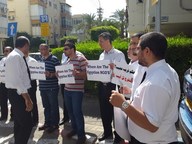
Dozens of Palestinian and Arab lawyers on Thursday flocked outside of the Egyptian embassy in Tel Aviv voicing their firm objection to Egyptian court verdicts ordering the mass-execution of democratically-elected Morsi and a number of Muslim Brotherhood affiliates.
The rally was staged by the Mizan Foundation for Human Rights outside the Egyptian Embassy in Tel Aviv in protest at the death penalties recently issued by Egyptian courts against anti-dictatorship activists, most notably the former elected President Mohammad Morsi, whose file was delivered to the Mufti pending final endorsement.
The rally-goers chanted slogans and lifted banners reading: “Such verdicts herald the end of Egypt’s judiciary;” “Let Tel Aviv rejoice at such a strange ruling;” and “The judiciary takes as many lives as al-Sissi wants,” among other slogans.
“The vigil makes part of a solidarity campaign with our Egyptian brothers who were kept down by the judiciary,” Head of Mizan institution, Firas Dalasha, said.
“We are here today to voice our sympathy for Egypt’s oppressed people. We’re trying hard to have our message heard by the Egyptian authorities,” he added.
For his part, spokesperson for the Islamic Movement, Zahi Njeidat, said: “The Palestinian people inside the Green Line are just part and parcel of the Arab and Muslim nation. . . . We’re not apathetic as regards what has been going on in Egypt or in any other state. Egyptians’ dream and pain and ours’ are just one and the same.”
“We stand here today to express our disapproval of the violations to which humanity has been subjected in the Egyptian territories,” he said, wondering: “How on earth could they dare slaughter innocent people, whose only ‘sin’ was to restore the rule of legitimacy and oust all malevolent coups?”
The rally was staged by the Mizan Foundation for Human Rights outside the Egyptian Embassy in Tel Aviv in protest at the death penalties recently issued by Egyptian courts against anti-dictatorship activists, most notably the former elected President Mohammad Morsi, whose file was delivered to the Mufti pending final endorsement.
The rally-goers chanted slogans and lifted banners reading: “Such verdicts herald the end of Egypt’s judiciary;” “Let Tel Aviv rejoice at such a strange ruling;” and “The judiciary takes as many lives as al-Sissi wants,” among other slogans.
“The vigil makes part of a solidarity campaign with our Egyptian brothers who were kept down by the judiciary,” Head of Mizan institution, Firas Dalasha, said.
“We are here today to voice our sympathy for Egypt’s oppressed people. We’re trying hard to have our message heard by the Egyptian authorities,” he added.
For his part, spokesperson for the Islamic Movement, Zahi Njeidat, said: “The Palestinian people inside the Green Line are just part and parcel of the Arab and Muslim nation. . . . We’re not apathetic as regards what has been going on in Egypt or in any other state. Egyptians’ dream and pain and ours’ are just one and the same.”
“We stand here today to express our disapproval of the violations to which humanity has been subjected in the Egyptian territories,” he said, wondering: “How on earth could they dare slaughter innocent people, whose only ‘sin’ was to restore the rule of legitimacy and oust all malevolent coups?”
19 may 2015

Professor, Abdullah Al-Ashaal
Egyptian professor of Law and Diplomatic International Relations Abdullah Al-Ashaal yesterday called for "direct" dialogue with Hamas, noting this would solve all outstanding issues, Quds Press reported.
Al-Ashaal, who is a former deputy foreign minister, also denounced the death sentences against Palestinian, some of whom died prior to the start of the Egyptian revolution while others have been held in jail for many years. He described these judicial verdicts a "scandal" for the Egyptian judiciary.
"No doubt these verdicts are scandalous for the Egyptian judiciary and the Egyptian state," he said, "even if the verdicts were political, judges should have checked the names."
He called for high-level dialogue between Egypt and Hamas, stressing that President Abdel Fatah Al-Sisi is able to sort out the differences with Hamas.
"This issue should be solved quietly," he said. "All Egyptians, regardless to their different views about resistance, have to get to a point where they become sure that Hamas has not been involved in any aggressive attacks against the Egyptian army."
Al-Ashaal insisted that the dialogue must be based on the basis that resistance is a supporter of Egypt and Egypt is a supporter of the resistance.
Meanwhile, he ruled chances that the authorities would carry out the death sentences against the freely elected President Mohamed Morsi and his colleagues. He called for Al-Sisi to take a "courageous" measure to stop such sentences.
He argued that there are different parties in Egypt trying to get rid of the Muslim Brotherhood, including followers of former President Jamal Abdul Nasser, secularists, liberals and even the Pope.
"If they wanted to get the Muslim Brotherhood out of political life, they had succeeded," he said. "But if they wanted to erase them from the life of Egyptians, they will never achieve their goal. They would, instead, lead the country into a state of explosion."
Egyptian professor of Law and Diplomatic International Relations Abdullah Al-Ashaal yesterday called for "direct" dialogue with Hamas, noting this would solve all outstanding issues, Quds Press reported.
Al-Ashaal, who is a former deputy foreign minister, also denounced the death sentences against Palestinian, some of whom died prior to the start of the Egyptian revolution while others have been held in jail for many years. He described these judicial verdicts a "scandal" for the Egyptian judiciary.
"No doubt these verdicts are scandalous for the Egyptian judiciary and the Egyptian state," he said, "even if the verdicts were political, judges should have checked the names."
He called for high-level dialogue between Egypt and Hamas, stressing that President Abdel Fatah Al-Sisi is able to sort out the differences with Hamas.
"This issue should be solved quietly," he said. "All Egyptians, regardless to their different views about resistance, have to get to a point where they become sure that Hamas has not been involved in any aggressive attacks against the Egyptian army."
Al-Ashaal insisted that the dialogue must be based on the basis that resistance is a supporter of Egypt and Egypt is a supporter of the resistance.
Meanwhile, he ruled chances that the authorities would carry out the death sentences against the freely elected President Mohamed Morsi and his colleagues. He called for Al-Sisi to take a "courageous" measure to stop such sentences.
He argued that there are different parties in Egypt trying to get rid of the Muslim Brotherhood, including followers of former President Jamal Abdul Nasser, secularists, liberals and even the Pope.
"If they wanted to get the Muslim Brotherhood out of political life, they had succeeded," he said. "But if they wanted to erase them from the life of Egyptians, they will never achieve their goal. They would, instead, lead the country into a state of explosion."

Emad Shahin is the editor-in-chief of The Oxford Encyclopedia of Islam and Politics and a professor of public policy. On Saturday, he was sentenced in absentia to death by an Egyptian court in the case where he was accused of colluding with Iran and the Palestinian group Hamas to destabilise Egypt.
In a statement, he denounced the verdict as a "travesty of justice". Shahin currently lives in the US and is visiting professor at Georgetown University's School of Foreign Service. Following the verdict Shahin released the following statement on his website:
In another travesty of justice, an Egyptian court today issued a mass death sentence against more than 120 defendants in two cases known as the "Grand Espionage" and "Prisons Break". I was falsely charged in the first case and I received the death sentence in absentia pending referral to the mufti. I repeat my absolute rejection of the charges against me and note that I am hardly the only victim of injustice in this case. Furthermore, I condemn the sham trials engulfing Egypt since July 2013 where wholesale death sentences on flimsy or no evidence have been the mark of the current military regime.
In fact, these sentences are yet another manifestation of the deeply troubling way the Egyptian judiciary has been used as a tool to settle political disagreements by the harshest and most repressive means possible. Due process, regard for evidence, and minimum standard of justice have been tossed aside in favor of draconian injustice. Ironically, two defendants sentenced to death today had already been dead and one has been in prison for the past 19 years. Amnesty International, Human Rights Watch, and many other human rights organisations have condemned the way the Egyptian Judiciary has been used to settle political scores.
The military-backed regime has been targeting peaceful opponents, young protesters, students, journalists and academics. It is currently seeking to reconstitute the security state and intimidate all opponents. For over two years, the army and security agencies have staged a counter-revolution against all those associated with January 25th Revolution, combatting the aspirations of Egyptians for building a free and democratic society. Agencies that are supposed to serve the people are instead oppressing them.
As an independent academic and scholar, I will continue to uphold and defend democratic values, human rights and national reconciliation. These are the exact values that Egypt needs at the moment to chart a peaceful course in the future. I believe this is the essence of why I was targeted and what my case is all about.
In a statement, he denounced the verdict as a "travesty of justice". Shahin currently lives in the US and is visiting professor at Georgetown University's School of Foreign Service. Following the verdict Shahin released the following statement on his website:
In another travesty of justice, an Egyptian court today issued a mass death sentence against more than 120 defendants in two cases known as the "Grand Espionage" and "Prisons Break". I was falsely charged in the first case and I received the death sentence in absentia pending referral to the mufti. I repeat my absolute rejection of the charges against me and note that I am hardly the only victim of injustice in this case. Furthermore, I condemn the sham trials engulfing Egypt since July 2013 where wholesale death sentences on flimsy or no evidence have been the mark of the current military regime.
In fact, these sentences are yet another manifestation of the deeply troubling way the Egyptian judiciary has been used as a tool to settle political disagreements by the harshest and most repressive means possible. Due process, regard for evidence, and minimum standard of justice have been tossed aside in favor of draconian injustice. Ironically, two defendants sentenced to death today had already been dead and one has been in prison for the past 19 years. Amnesty International, Human Rights Watch, and many other human rights organisations have condemned the way the Egyptian Judiciary has been used to settle political scores.
The military-backed regime has been targeting peaceful opponents, young protesters, students, journalists and academics. It is currently seeking to reconstitute the security state and intimidate all opponents. For over two years, the army and security agencies have staged a counter-revolution against all those associated with January 25th Revolution, combatting the aspirations of Egyptians for building a free and democratic society. Agencies that are supposed to serve the people are instead oppressing them.
As an independent academic and scholar, I will continue to uphold and defend democratic values, human rights and national reconciliation. These are the exact values that Egypt needs at the moment to chart a peaceful course in the future. I believe this is the essence of why I was targeted and what my case is all about.
18 may 2015
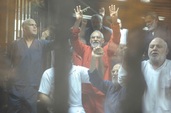
Muslim Brotherhood's Supreme Guide, Mohammed Badie, is amongst those recommended for a death sentence
Egyptian and foreign activists and politicians have warned of dire consequences to the court ruling on Saturday sentencing President Mohammad Morsi and a number of Muslim Brotherhood leaders to death in the case of "communication with Hamas" and the case of "fleeing from prison" on the eve of the January 2011 Revolution. Kuwaiti preacher Tariq Suwaidan has said that the execution of Morsi and other Muslim Brotherhood leaders will pull Egypt down the path of a civil war.
Writing on Facebook, Suwaidan said: "We endeavour to restrain the youth and maintain peacefulness. Yet, they (the authorities) are intent on driving them toward violence and civil war by means of sentencing to death President Morsi, Scholar Al-Qaradawi, Al-Shatir, Al-Beltagy and hundreds of their brothers and leaders. Where are the wise people within as well as outside Egypt? Why don't they do something to prevent Egypt from being pulled down into this disaster?"
A serious threat to civic peace Commenting on the sentencing to death of Morsi and other Muslim Brotherhood leaders, the 6 April Youth Movement has said that "the corrupt judiciary, which is contemptuous of the January Revolution for having called for purging it, only drives society toward vengeance and hatred having agreed to perform the role of a cane in the hand of the oppressive dictatorial regime.
The movement's statement on its Facebook page added: "the latest death sentences represent a serious escalation that threatens civic peace and leads to chaos as a result of society's loss of confidence in the system of justice." The movement called on the Egyptian people "not to slide down the route of vengeful retaliation that threatens societal peace and to stand in the face of all forms of injustice and violence."
A court has sentenced 122 persons to death including President Morsi, the leader of the Muslim Brotherhood Mohammad Badei, his deputy Khayrat Al-Shatir, former Parliament Speaker Saad Al-Katatni and a number of other Muslim Brotherhood leaders such as Issam Al-Iryan and Muhammad Al-Beltagy in addition to Sheikh Yusuf Al-Qaradawi, Chairman of the International Federation of Muslim Scholars, and several members of Hamas and Hezbollah. On the 2nd of June the court is supposed to convene again in order to give a final verdict having referred the sentences for consultation with the grand Mufti.
The British Guardian newspaper reported the warnings made by Islamists in Egypt against the dire repercussions of sentencing to death the first elected president in the history of the country.
In a report published on Saturday under the title of "Islamists warn against the repercussions of executing Morsi" that "in case the death sentence against Morsi is finally confirmed on the 2nd of June, analysts believe that the country will witness a violence backlash that may force the regime to repeal the death sentence, especially in view of the fact that Morsi had previously been sentenced to a long term of imprisonment in another case, very much nearing a life sentence."
Israel's Second TV Channel has said it expects the death sentences to cause a new and massive wave of violence in Egypt that is "led this time by the supporters of President Morsi".
The channel added in one of its reports: "Nearly two years following the coup exacted by army leader Abd Al-Fattah Al-Sisi against President Morsi and the launch of an extensive operation by the army against the Muslim Brotherhood, as a result of which hundreds have been killed and several thousands detained, the Egyptians are fearful that the recent death sentence against Morsi might ignite a new wave of violence protests in an unprecedented manner."
Inciting the taking up of arms While hundreds of young members of the Muslim Brotherhood struggle to self restrain and hold back their reactions while seeing their own friends and relatives languish behind bars in military jails and receive harsh death and life prison sentences, these young men are coming under enormous pressure from their peers inside armed groups such as ISIS and others who urge them to resort to arms.
The members of such armed groups boast about their action of avenging the killing or persecution of their own colleagues without delay. They also take pride in killing soldiers and policemen thanks to the arms in their hands that enable them to fight against the oppressors. At the same time they ridicule the members of the Muslim Brotherhood who stand receiving bullets in their bare chests while being content with reciting prayers and asking Allah to deliver them from the injustice imposed on them.
Members of the Sinai branch of ISIS have been reported as pouring scorn on the members of the Muslim Brotherhood in the aftermath of the court's decision to sentence Muhammad Morsi and other Brotherhood leaders to death by publishing two pictures next to each other one of them features the leaders of the Brotherhood standing behind bars while the other features elements of the Sinai branch of ISIS standing over the body of an army soldier they had just killed. The combined pictures bore a caption saying: "The might of Jihad versus the subservience of peacefulness .. you choose".
The twitter account of Dabiq Channel, which speaks for the ISIS organisation said: "While members of the Muslim Brotherhood are weeping over the injustices exacted upon them by the judiciary in the form of mass death sentences, you will find the men of the Sinai Branch of ISIS slaughtering Sisi judges (alluding to the slaying of three judges at Al-Arish). That's the difference between subservience and might."
Egyptian and foreign activists and politicians have warned of dire consequences to the court ruling on Saturday sentencing President Mohammad Morsi and a number of Muslim Brotherhood leaders to death in the case of "communication with Hamas" and the case of "fleeing from prison" on the eve of the January 2011 Revolution. Kuwaiti preacher Tariq Suwaidan has said that the execution of Morsi and other Muslim Brotherhood leaders will pull Egypt down the path of a civil war.
Writing on Facebook, Suwaidan said: "We endeavour to restrain the youth and maintain peacefulness. Yet, they (the authorities) are intent on driving them toward violence and civil war by means of sentencing to death President Morsi, Scholar Al-Qaradawi, Al-Shatir, Al-Beltagy and hundreds of their brothers and leaders. Where are the wise people within as well as outside Egypt? Why don't they do something to prevent Egypt from being pulled down into this disaster?"
A serious threat to civic peace Commenting on the sentencing to death of Morsi and other Muslim Brotherhood leaders, the 6 April Youth Movement has said that "the corrupt judiciary, which is contemptuous of the January Revolution for having called for purging it, only drives society toward vengeance and hatred having agreed to perform the role of a cane in the hand of the oppressive dictatorial regime.
The movement's statement on its Facebook page added: "the latest death sentences represent a serious escalation that threatens civic peace and leads to chaos as a result of society's loss of confidence in the system of justice." The movement called on the Egyptian people "not to slide down the route of vengeful retaliation that threatens societal peace and to stand in the face of all forms of injustice and violence."
A court has sentenced 122 persons to death including President Morsi, the leader of the Muslim Brotherhood Mohammad Badei, his deputy Khayrat Al-Shatir, former Parliament Speaker Saad Al-Katatni and a number of other Muslim Brotherhood leaders such as Issam Al-Iryan and Muhammad Al-Beltagy in addition to Sheikh Yusuf Al-Qaradawi, Chairman of the International Federation of Muslim Scholars, and several members of Hamas and Hezbollah. On the 2nd of June the court is supposed to convene again in order to give a final verdict having referred the sentences for consultation with the grand Mufti.
The British Guardian newspaper reported the warnings made by Islamists in Egypt against the dire repercussions of sentencing to death the first elected president in the history of the country.
In a report published on Saturday under the title of "Islamists warn against the repercussions of executing Morsi" that "in case the death sentence against Morsi is finally confirmed on the 2nd of June, analysts believe that the country will witness a violence backlash that may force the regime to repeal the death sentence, especially in view of the fact that Morsi had previously been sentenced to a long term of imprisonment in another case, very much nearing a life sentence."
Israel's Second TV Channel has said it expects the death sentences to cause a new and massive wave of violence in Egypt that is "led this time by the supporters of President Morsi".
The channel added in one of its reports: "Nearly two years following the coup exacted by army leader Abd Al-Fattah Al-Sisi against President Morsi and the launch of an extensive operation by the army against the Muslim Brotherhood, as a result of which hundreds have been killed and several thousands detained, the Egyptians are fearful that the recent death sentence against Morsi might ignite a new wave of violence protests in an unprecedented manner."
Inciting the taking up of arms While hundreds of young members of the Muslim Brotherhood struggle to self restrain and hold back their reactions while seeing their own friends and relatives languish behind bars in military jails and receive harsh death and life prison sentences, these young men are coming under enormous pressure from their peers inside armed groups such as ISIS and others who urge them to resort to arms.
The members of such armed groups boast about their action of avenging the killing or persecution of their own colleagues without delay. They also take pride in killing soldiers and policemen thanks to the arms in their hands that enable them to fight against the oppressors. At the same time they ridicule the members of the Muslim Brotherhood who stand receiving bullets in their bare chests while being content with reciting prayers and asking Allah to deliver them from the injustice imposed on them.
Members of the Sinai branch of ISIS have been reported as pouring scorn on the members of the Muslim Brotherhood in the aftermath of the court's decision to sentence Muhammad Morsi and other Brotherhood leaders to death by publishing two pictures next to each other one of them features the leaders of the Brotherhood standing behind bars while the other features elements of the Sinai branch of ISIS standing over the body of an army soldier they had just killed. The combined pictures bore a caption saying: "The might of Jihad versus the subservience of peacefulness .. you choose".
The twitter account of Dabiq Channel, which speaks for the ISIS organisation said: "While members of the Muslim Brotherhood are weeping over the injustices exacted upon them by the judiciary in the form of mass death sentences, you will find the men of the Sinai Branch of ISIS slaughtering Sisi judges (alluding to the slaying of three judges at Al-Arish). That's the difference between subservience and might."
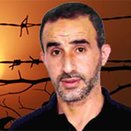
A Palestinian prisoner who has been held by Israel for the past 20 years has declared the sentence of death handed to him by an Egyptian court to be a "badge of honour", Middle East Monitor reports.
Hassan Salama was sentenced by Egypt for allegedly breaking into Wadi Al-Natroon Prison in Egypt during the 25. January 2011 Revolution, along with other three Palestinians, two of whom were killed a few years before the alleged offence; the third was killed in Palestine during Israel's offensive last year.
"I consider the Egyptian death sentence against me to be a badge of honour on my chest," Salama wrote in a letter leaked from his cell. "This sentence was a grant from Egypt to a Palestinian prisoner marking 20 years inside Israeli jails. It is an appreciation for him and his family."
He added his thanks to "beloved" Egypt for its "generosity". Egypt, he said, is more merciful than the "Israeli enemy", which refused to sentence him to death 20 years ago.
"The [Israeli] military court was recommended not to sentence me to death, in the belief that we do not care about death," added Salama. "In doing so, it decided that I have to experience death every single day while spending my life between four walls."
Mocking the death sentence, he noted that after 20 years, it came to palliate his suffering and accelerate his death. "This is the best thing to do for me."
Concluding his letter, Salama reiterated that he does not fear death and such a sentence does not affect him. "I have much hope that Allah would help me and I have enough trust that Al-Qassam Brigades, who beat occupation and freed prisoners, will liberate me," writes Middle East Monitor.
Hassan Salama was sentenced by Egypt for allegedly breaking into Wadi Al-Natroon Prison in Egypt during the 25. January 2011 Revolution, along with other three Palestinians, two of whom were killed a few years before the alleged offence; the third was killed in Palestine during Israel's offensive last year.
"I consider the Egyptian death sentence against me to be a badge of honour on my chest," Salama wrote in a letter leaked from his cell. "This sentence was a grant from Egypt to a Palestinian prisoner marking 20 years inside Israeli jails. It is an appreciation for him and his family."
He added his thanks to "beloved" Egypt for its "generosity". Egypt, he said, is more merciful than the "Israeli enemy", which refused to sentence him to death 20 years ago.
"The [Israeli] military court was recommended not to sentence me to death, in the belief that we do not care about death," added Salama. "In doing so, it decided that I have to experience death every single day while spending my life between four walls."
Mocking the death sentence, he noted that after 20 years, it came to palliate his suffering and accelerate his death. "This is the best thing to do for me."
Concluding his letter, Salama reiterated that he does not fear death and such a sentence does not affect him. "I have much hope that Allah would help me and I have enough trust that Al-Qassam Brigades, who beat occupation and freed prisoners, will liberate me," writes Middle East Monitor.

An Egyptian naval boat on Sunday afternoon chased a Palestinian fishing boat inside the Palestinian territorial waters of the Gaza Strip.
Local sources said that an Egyptian gunboat ignored the presence of Palestinian coast police forces in the area and went after a fishing boat near the shores of Gaza in an attempt to confiscate it.
The Egyptian boat were still inside Gaza's waters until the moment of preparing this report.
The incident was seen by the Palestinian authorities in Gaza as a serious Egyptian violation of the Palestinian territorial waters.
Local sources said that an Egyptian gunboat ignored the presence of Palestinian coast police forces in the area and went after a fishing boat near the shores of Gaza in an attempt to confiscate it.
The Egyptian boat were still inside Gaza's waters until the moment of preparing this report.
The incident was seen by the Palestinian authorities in Gaza as a serious Egyptian violation of the Palestinian territorial waters.
17 may 2015
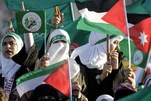
Islamic Resistance Movement, Hamas, called on all the free people of the world along with the Arabs and Muslims to intervene to reverse the unjust Egyptian decisions.
In a press statement on Sunday, Hamas Movement asked the human rights and legal organizations in the world to intervene to halt what it called a “political farce” which spreads injustice and Fascism again in the world.
The Egyptian decisions legitimize the Israeli crimes against the Palestinian people and resistance. The Palestinian resistance, however, will continue despite all the attempts to end it, Hamas said.
It opined that the decisions are politicized and null and void as they lack evidence and are based on false information.
Hamas renewed its confirmation that it has not intervened and will not intervene in the Egyptian internal affairs and stressed its refusal of being involved in the Egyptian internal conflict.
Hamas underlined that the Egyptian decisions will not push it to change its stand toward Egypt and its people, calling on the free people of the world to stop what it described as the “Judicial Massacre”.
In a press statement on Sunday, Hamas Movement asked the human rights and legal organizations in the world to intervene to halt what it called a “political farce” which spreads injustice and Fascism again in the world.
The Egyptian decisions legitimize the Israeli crimes against the Palestinian people and resistance. The Palestinian resistance, however, will continue despite all the attempts to end it, Hamas said.
It opined that the decisions are politicized and null and void as they lack evidence and are based on false information.
Hamas renewed its confirmation that it has not intervened and will not intervene in the Egyptian internal affairs and stressed its refusal of being involved in the Egyptian internal conflict.
Hamas underlined that the Egyptian decisions will not push it to change its stand toward Egypt and its people, calling on the free people of the world to stop what it described as the “Judicial Massacre”.
16 may 2015
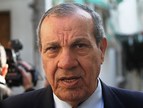
Palestinian factions including Fatah and the Popular Front movements called on Egypt to revise its court rulings against Palestinians on Saturday.
Fatah leader Yahya Rabah said “the Egyptian rulings against the Palestinians need to be revised carefully since it has wrong information”.
Rabah said, in a press statement, that there is a big chance to cancel the Egyptian court decision by the Egyptian Judicial mechanism itself because there is false information.
He referred to a previous ruling on Hamas which classified it as a “terrorist” group and it was canceled later on because it was based on fake evidences.
“The verdicts can be voided by appeal and heading to the Egyptian Court of Cassation,” he said.
The Fatah leader Rabah said he was shocked by the large number of the accused by the Egyptian judiciary.
For his part, member of the Popular Front’s political bureau Rabah Muhanna opined that none of the Palestinians has intervened in the Egyptian affairs.
Muhanna also called on the Egyptian authorities to revise its accusations against any of the Palestinians.
An Egyptian court earlier on Saturday referred the files of several Egyptian officials affiliated with the Muslim Brotherhood in the country as well as Hamas members to the Grand Mufti to give his final word on their death penalties over their alleged involvement in releasing prisoners from an Egyptian local jail.
The list of the accused Hamas members includes Hamas leader prisoner Hassan Salamah who has been detained in Israeli jails for 19 years, martyr Raed al-Attar who was assassinated by Israeli forces in last summer’s Israeli war on Gaza in 2014.
The list also includes martyr Tayseer Abu Snaimeh who was killed in 2009 two months before the Egyptian uprising in addition to many others who have never been to Egypt.
Fatah leader Yahya Rabah said “the Egyptian rulings against the Palestinians need to be revised carefully since it has wrong information”.
Rabah said, in a press statement, that there is a big chance to cancel the Egyptian court decision by the Egyptian Judicial mechanism itself because there is false information.
He referred to a previous ruling on Hamas which classified it as a “terrorist” group and it was canceled later on because it was based on fake evidences.
“The verdicts can be voided by appeal and heading to the Egyptian Court of Cassation,” he said.
The Fatah leader Rabah said he was shocked by the large number of the accused by the Egyptian judiciary.
For his part, member of the Popular Front’s political bureau Rabah Muhanna opined that none of the Palestinians has intervened in the Egyptian affairs.
Muhanna also called on the Egyptian authorities to revise its accusations against any of the Palestinians.
An Egyptian court earlier on Saturday referred the files of several Egyptian officials affiliated with the Muslim Brotherhood in the country as well as Hamas members to the Grand Mufti to give his final word on their death penalties over their alleged involvement in releasing prisoners from an Egyptian local jail.
The list of the accused Hamas members includes Hamas leader prisoner Hassan Salamah who has been detained in Israeli jails for 19 years, martyr Raed al-Attar who was assassinated by Israeli forces in last summer’s Israeli war on Gaza in 2014.
The list also includes martyr Tayseer Abu Snaimeh who was killed in 2009 two months before the Egyptian uprising in addition to many others who have never been to Egypt.

The higher committee of Hamas prisoners in Israeli jails denounced the Egyptian court verdict ordering the execution of Hamas leader captive Hassan Salamah.
The committee said, in a statement on Saturday evening, that the Egyptian court ruling is against the Palestinian resistance of the Israeli occupation and constitutes a free service to Israel”.
The committee called on Egypt to comprehensively revise all of its policies towards that Palestinian Question especially the files of the besieged Gaza Strip and resistance.
An Egyptian court earlier on Saturday referred the files of several Egyptian officials affiliated with the Muslim Brotherhood in the country as well as Hamas members to the Grand Mufti to give his final word on their death penalties over their alleged involvement in releasing prisoners from an Egyptian local jail.
The list of the accused Hamas members includes Hamas leader prisoner Hassan Salamah who has been detained in Israeli jails for 19 years, martyr Raed al-Attar who was assassinated by Israeli forces in last summer’s Israeli war on Gaza in 2014.
The list also includes martyr Tayseer Abu Snaimeh who was killed in 2009 two months before the Egyptian uprising had been lunched in addition to many others who have never been to Egypt.
The committee said, in a statement on Saturday evening, that the Egyptian court ruling is against the Palestinian resistance of the Israeli occupation and constitutes a free service to Israel”.
The committee called on Egypt to comprehensively revise all of its policies towards that Palestinian Question especially the files of the besieged Gaza Strip and resistance.
An Egyptian court earlier on Saturday referred the files of several Egyptian officials affiliated with the Muslim Brotherhood in the country as well as Hamas members to the Grand Mufti to give his final word on their death penalties over their alleged involvement in releasing prisoners from an Egyptian local jail.
The list of the accused Hamas members includes Hamas leader prisoner Hassan Salamah who has been detained in Israeli jails for 19 years, martyr Raed al-Attar who was assassinated by Israeli forces in last summer’s Israeli war on Gaza in 2014.
The list also includes martyr Tayseer Abu Snaimeh who was killed in 2009 two months before the Egyptian uprising had been lunched in addition to many others who have never been to Egypt.

The Hamas Movement has expressed its regret and dismay over an Egyptian court verdict ordering the execution of some of its members over their alleged involvement in releasing prisoners from a local jail.
Hamas spokesman Sami Abu Zuhri told Anadolu news agency that the Egyptian court ruling was "very unfortunate."
"The case is politicized and the verdict is a dark spot in the Egyptian judiciary's record, where resistance fighters, including martyrs and prisoners [in Israeli jails], have been judged," Abu Zuhri stated.
An Egyptian court on Saturday referred the files of several Egyptian officials affiliated with the Muslim Brotherhood in the country as well as Hamas members to the Grand Mufti to give his final word over their death penalties.
Hamas spokesman Sami Abu Zuhri told Anadolu news agency that the Egyptian court ruling was "very unfortunate."
"The case is politicized and the verdict is a dark spot in the Egyptian judiciary's record, where resistance fighters, including martyrs and prisoners [in Israeli jails], have been judged," Abu Zuhri stated.
An Egyptian court on Saturday referred the files of several Egyptian officials affiliated with the Muslim Brotherhood in the country as well as Hamas members to the Grand Mufti to give his final word over their death penalties.
